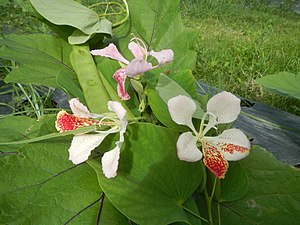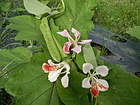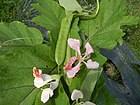Note: This is a project under development. The articles on this wiki are just being initiated and broadly incomplete. You can Help creating new pages.
Bauhinia purpurea
Bauhinia purpurea is an erect, evergreen shrub. It grows up to 7 - 10 metres tall. The tree has a wide range of local uses. It should also make an excellent pioneer species and is commonly cultivated as an ornamental.
Contents
- 1 Uses
- 2 Parts Used
- 3 Chemical Composition
- 4 Common names
- 5 Properties
- 6 Habit
- 7 Identification
- 8 List of Ayurvedic medicine in which the herb is used
- 9 Where to get the saplings
- 10 Mode of Propagation
- 11 Cultivation Details
- 12 Season to grow
- 13 Required Ecosystem/Climate
- 14 Kind of soil needed
- 15 Commonly seen growing in areas
- 16 Photo Gallery
- 17 References
- 18 External Links
Uses
[[:Category:Ayurvedic Herbs known to be helpful to treat |]], [[:Category:Ayurvedic Herbs known to be helpful to treat |]], [[:Category:Ayurvedic Herbs known to be helpful to treat |]], [[:Category:Ayurvedic Herbs known to be helpful to treat |]], [[:Category:Ayurvedic Herbs known to be helpful to treat |]], [[:Category:Ayurvedic Herbs known to be helpful to treat |]], [[:Category:Ayurvedic Herbs known to be helpful to treat |]], [[:Category:Ayurvedic Herbs known to be helpful to treat |]], [[:Category:Ayurvedic Herbs known to be helpful to treat |]], [[:Category:Ayurvedic Herbs known to be helpful to treat |]], [[:Category:Ayurvedic Herbs known to be helpful to treat |]].
Food
Bauhinia purpurea can be used in food. Flowers are cooked as vegetable.
Parts Used
Seeds, Flower buds, Flowers, Root.
Chemical Composition
Eleven new secondary metabolites (1−11), together with two known flavanones (12 and 13) and five known bibenzyls.[1]
Common names
| Language | Common name |
|---|---|
| Kannada | ಕಂಚುವಾಳ Kanchuvaala, ಕಂಚಿವಾಳ Kanchivaala |
| Hindi | Kaniar |
| Malayalam | |
| Tamil | Nilattiruvatti |
| Telugu | |
| Marathi | Rakta kanchan |
| Gujarathi | |
| Punjabi | |
| Kashmiri | |
| Sanskrit | Devakanchan |
| English | Purple Orchid Tree, Butterfly tree |
Properties
Reference: Dravya - Substance, Rasa - Taste, Guna - Qualities, Veerya - Potency, Vipaka - Post-digesion effect, Karma - Pharmacological activity, Prabhava - Therepeutics.
Dravya
Rasa
Guna
Veerya
Vipaka
Karma
Prabhava
Nutritional components
Bauhinia purpurea contains the Following nutritional components like Vitamin-C and E; Calcium, Iron, Magnesium, Potassium, Phosphorus, Sodium[3]
Habit
Identification
Leaf
| Kind | Shape | Feature |
|---|---|---|
Flower
| Type | Size | Color and composition | Stamen | More information |
|---|---|---|---|---|
| {{{5}}} |
Fruit
| Type | Size | Mass | Appearance | Seeds | More information |
|---|---|---|---|---|---|
Other features
List of Ayurvedic medicine in which the herb is used
Where to get the saplings
Mode of Propagation
Cultivation Details
A plant of subtropical to tropical regions where it can usually be found at elevations from 500 - 2,000 metres, exceptionally to 3,000 metres. Bauhinia purpurea is available through October to January[5]
Season to grow
Dry season.
Required Ecosystem/Climate
Kind of soil needed
Clay; loam; sand; slightly alkaline;acidic; well-drained soil.[6]
Commonly seen growing in areas
Mixed deciduous forests, On hill slopes.
Photo Gallery
References
- ↑ Chemical constituents
- ↑ Common names
- ↑ Forest food for Northern region of western ghat pdf by Dr. Mandar N. Datar and Dr. Anuradha S. Upadhye, MACS - Agharkar Research Institute, Pune
- ↑ [Morphology]
- ↑ Cultivation
- ↑ Kind of soil needed
External Links
- Ayurvedic Herbs known to be helpful to treat
- Herbs with Seeds used in medicine
- Herbs with Flower buds used in medicine
- Herbs with Flowers used in medicine
- Herbs with Root used in medicine
- Herbs with common name in Kannada
- Herbs with common name in Hindi
- Herbs with common name in Tamil
- Herbs with common name in Marathi
- Herbs with common name in Sanskrit
- Herbs with common name in English
- Habit - Evergreen tree
- Index of Plants which can be propagated by Seeds
- Index of Plants which can be propagated by Cuttings
- Herbs that are commonly seen in the region of Mixed deciduous forests
- Herbs that are commonly seen in the region of On hill slopes
- Herbs
- Pages without herbs images





